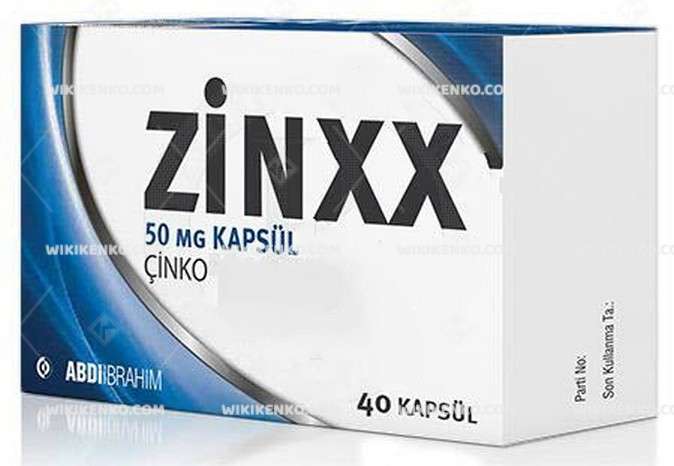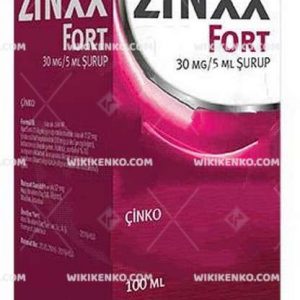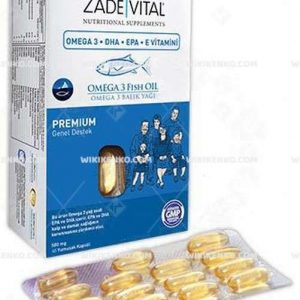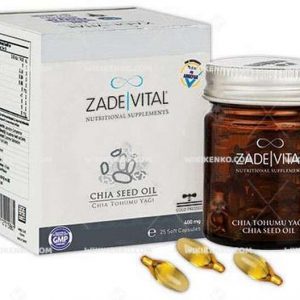Zinxx Capsule
Zinxx Capsule, a vital medication containing essential zinc, serves as a crucial player in the prevention and treatment of zinc deficiency. Zinc, an indispensable naturally occurring mineral, plays a pivotal role in the growth and development of body tissues. In this comprehensive guide, we delve into the composition, indications, contraindications, precautions, administration, potential side effects, drug interactions, recommended dosage, duration of use, and the numerous benefits of Zinxx.
| Dosage form | |
|---|---|
| Pack size | |
| Potency | 50 Mg |
| Manufacturer | |
| Origin | |
| Generic Name (Ingredient) | Each Capsule Contains 137.21 Mg Zinc Sulfate Equivalent To 50 Mg Zinc As The Active Ingredient. |
Assuming your emergency circumstances for this product, visit Urgent Quotation page. Besides, for any pharmaceutical questions, please ask us in the comments section.
Description
Composition
Let’s begin our exploration with the formulation of Zinxx. Each Zinxx capsule is meticulously crafted to contain 50 mg of zinc, which is equivalent to 137.21 mg of zinc sulfate. This formulation is complemented by several auxiliary substances, including lactose granules (sourced from cow’s milk), corn starch, talc, colloidal silicon dioxide (200), magnesium stearate, red iron oxide, titanium dioxide, and gelatin (from beef).
Indications
Understanding the key indications for Zinxx is imperative. Zinxx primarily finds its application in the prevention and treatment of zinc deficiency, a condition where the body’s zinc levels fall below the optimal range. Furthermore, it is a valuable therapeutic agent in addressing conditions characterized by the excessive accumulation of copper within the body, such as Wilson’s disease. Additionally, Zinxx is a crucial component of the therapeutic regimen for individuals suffering from zinc absorption disorders, notably acrodermatitis enteropathica.
Contraindications
While Zinxx can be a potent remedy, it is vital to recognize its contraindications. Individuals who exhibit hypersensitivity to zinc salts or any of the components found within Zinxx should refrain from its use.
Precautions
Zinxx, like any medication, warrants careful consideration and a few notable precautions:
- Unexplained Diarrhea in Adults: Zinxx is not recommended for the treatment of unexplained diarrhea in adults.
- Diarrhea in Children: In cases where the product contains more than 30 mg of zinc, it should not be employed for the treatment of diarrhea in children.
- Kidney and Liver Diseases: Individuals with underlying kidney and liver diseases should seek guidance from their healthcare provider before initiating Zinxx therapy, as there is a dearth of comprehensive studies regarding its usage in these specific conditions.
- Long-Term Use: Prolonged utilization of Zinxx can lead to copper deficiency, thus necessitating close medical supervision.
Administration
The mode of administration is an essential aspect of any medication. Zinxx is administered orally and can be taken with meals, which often enhances its tolerability and absorption. However, it is crucial to avoid concurrent consumption with foods that are rich in bran, calcium, or phosphorus, as they may hinder the optimal absorption of zinc within the body.
Side Effects
As with any medication, Zinxx is not exempt from potential side effects. While not everyone may experience them, it is imperative to be cognizant of their occurrence. Here are some potential side effects:
Common Side Effects
- Nausea: Nausea is a frequently encountered side effect, a characteristic shared with many medications, including Zinxx.
- Vomiting: Some individuals may experience vomiting following the administration of Zinxx.
- Diarrhea: Diarrhea is another common side effect that may manifest after Zinxx consumption.
- Mouth Irritation: In certain cases, patients have reported mouth irritation, particularly when ingesting zinc gluconate tablets that dissolve in the mouth.
Less Common Side Effects
- Constipation: Constipation may be experienced by some individuals.
- Stomach Pain: In certain cases, stomach pain may occur.
- Flatulence: Increased gas may be a less common side effect.
- Loss of Appetite: Some individuals may experience a reduced appetite.
- Weakness: A sensation of weakness may be noted in certain cases.
- Flu-like Symptoms: In rare instances, individuals may exhibit symptoms akin to the flu.
It is essential to bear in mind that these side effects should be reported to a healthcare provider, should they manifest in an unusual or severe manner.
Drug Interactions
Zinxx, being a zinc-based medication, can interact with several other drugs, categorized into major, moderate, minor, and unknown interactions. Here’s a closer look at these interactions:
Major Interactions
- Antibiotics: The concurrent use of Zinxx with quinolone or tetracycline antibiotics can potentially interfere with their bactericidal efficacy. To mitigate this effect, it is advisable to administer the antibiotic at least two hours before or four to six hours after Zinxx.
- Penicillamine: Zinxx, when used alongside penicillamine, a drug utilized in the treatment of rheumatoid arthritis, can potentially diminish the latter’s ability to alleviate arthritis symptoms. To optimize the therapeutic outcome, Zinxx should be taken at least two hours before or after penicillamine administration.
Moderate Interactions
- Thiazide Diuretics: These blood pressure-regulating drugs have the potential to increase the excretion of zinc in urine.
Minor Interactions
- There are no known minor interactions with Zinxx.
Unknown Interactions
- There is currently no documented information regarding unknown interactions with Zinxx.
It is imperative for healthcare providers to be informed of all medications a patient is taking to ensure their safety and therapeutic efficacy.
Recommended Dosage
Understanding the appropriate dosage is essential for optimizing the therapeutic benefit of Zinxx. Dosage recommendations are contingent on an individual’s age, overall health status, and the specific condition being treated. Here are some general guidelines:
Adults
For adults, the upper limit dosage of zinc is considered to be 40 mg per day, as per the guidelines from the National Institutes of Health.
Infants
Infants under the age of six months are advised to adhere to an upper limit of 4 mg of zinc per day.
Specific Conditions
In specific cases, higher doses may be recommended. For instance, research indicates that the use of zinc lozenges containing 80–92 mg of zinc can potentially reduce the duration of the common cold by up to 33%.
It is important to emphasize that these are general guidelines and may not be universally applicable. Therefore, it is prudent to consult with a healthcare professional for personalized dosage recommendations tailored to individual needs.
Duration of Use
The duration of Zinxx utilization is influenced by an individual’s health status and the specific condition being treated. Broadly speaking, there are two categories:
Short-Term Use
For minor conditions or general supplementation, Zinxx may be employed for a relatively short duration, which typically ranges from a few days to a few weeks.
Long-Term Use
In cases where chronic conditions or severe zinc deficiency are involved, Zinxx may be utilized over an extended period, under the watchful eye of a healthcare professional.
As with all aspects of Zinxx usage, it is imperative to consult with a healthcare provider to determine the most appropriate and personalized duration of use.
Zinxx Capsule Benefits
Zinxx, as a zinc-based medication, brings a host of benefits to the table, all anchored in the essential role that zinc plays in the body. Here are some key advantages:
Essential Nutrient
Zinc is classified as a trace mineral, signifying that only a small daily quantity is required for optimal functioning. It is a ubiquitous essential nutrient found throughout the body, contributing to the normal operation of the immune system and metabolism.
Wound Healing
Zinc is indispensable for the wound healing process. Individuals with skin ulcers and suboptimal zinc levels can derive substantial benefits from oral zinc supplements, as they aid in the effective healing of wounds.
Immune System Support
Zinc plays a pivotal role in bolstering the immune system. Research indicates that the timely administration of zinc lozenges or syrup, initiated within 24 hours of the onset of cold symptoms, can effectively shorten the duration of colds.
Development Support
Zinc is an essential component in the development of the reproductive system and contributes to the development of the fetus during pregnancy. It also plays a vital role in the regulation of the senses of taste and smell.
Protein and DNA Production
The body harnesses zinc in the synthesis of proteins and the formation of DNA, underlining its crucial role in various physiological processes.
Precautions
In the interest of patient safety, Zinxx should be approached with caution. Consider the following precautions:
General Precautions
- Zinxx is not indicated for the treatment of unexplained diarrhea in adults.
- In cases where the product contains more than 30 mg of zinc, it should not be administered to treat diarrhea in children.
- Individuals with kidney and liver diseases should consult their healthcare provider before embarking on Zinxx therapy, as comprehensive data on its use in these specific conditions is limited.
- Prolonged utilization of Zinxx can potentially result in copper deficiency, necessitating close medical supervision.
Drug Interactions
- Avoid concurrent consumption of Zinxx with foods rich in bran, calcium, or phosphorus, as they may compromise the optimal absorption of the medication.
- If the patient is taking eltrombopag or antibiotics such as quinolone (e.g., levofloxacin) or tetracycline (e.g., doxycycline), it is prudent to seek guidance from a healthcare provider or pharmacist regarding the appropriate administration of Zinxx alongside these medications.
Missed Dose
In the event of a missed dose of Zinxx, it is recommended to take it as soon as possible. However, if the next scheduled dose is imminent, it is advisable to skip the missed dose and revert to the regular dosing schedule. It is essential to refrain from administering double doses.
Conclusion
In conclusion, Zinxx, as a zinc-based medication, holds a significant position in the realm of healthcare, addressing zinc deficiency and facilitating wound healing. However, it is not without its potential side effects and drug interactions. Therefore, informed and cautious usage, guided by healthcare professionals, is pivotal in harnessing the benefits of Zinxx while minimizing risks.
| Topic | Content |
|---|---|
| Composition | 50 mg zinc, auxiliary substances |
| Indications | Zinc deficiency, copper accumulation, absorption disorders |
| Contraindications | Allergic to zinc salts or components |
| Precautions | Unexplained diarrhea, children, kidney and liver diseases, long-term use |
| Administration | Oral, with meals, avoid certain foods |
| Side Effects | Nausea, vomiting, diarrhea, mouth irritation, constipation, stomach pain, flatulence, loss of appetite, weakness, flu-like symptoms |
| Drug Interactions | Major: Antibiotics, Penicillamine; Moderate: Thiazide Diuretics; Minor: None; Unknown: None |
| Recommended Dosage | Adults: 40 mg/day; Infants: 4 mg/day; Higher doses for specific conditions |
| Duration of Use | Short-term (days to weeks) or long-term (under healthcare supervision) |
| Benefits | Essential nutrient, wound healing, immune system support, development, protein and DNA production |
| Precautions | General, drug interactions, missed doses |
Use the form below to report an error
Please answer the questions as thoroughly and accurately as possible. Your answers will help us better understand what kind of mistakes happen, why and where they happen, and in the end the purpose is to build a better archive to guide researchers and professionals around the world.
The information on this page is not intended to be a substitute for professional medical advice, diagnosis, or treatment. always seek the advice for your physician or another qualified health provider with any questions you may have regarding a medical condition. Always remember to
- Ask your own doctor for medical advice.
- Names, brands, and dosage may differ between countries.
- When not feeling well, or experiencing side effects always contact your own doctor.
Cyberchondria
The truth is that when we’re sick, or worried about getting sick, the internet won’t help.
According to Wikipedia, cyberchondria is a mental disorder consisting in the desire to independently make a diagnosis based on the symptoms of diseases described on Internet sites.
Why you can't look for symptoms on the Internet
If diagnoses could be made simply from a textbook or an article on a website, we would all be doctors and treat ourselves. Nothing can replace the experience and knowledge of specially trained people. As in any field, in medicine there are unscrupulous specialists, differences of opinion, inaccurate diagnoses and incorrect test results.







Reviews
There are no reviews yet.